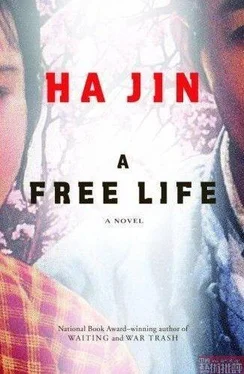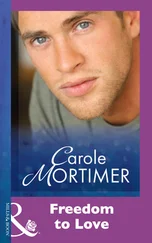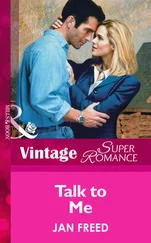"Then Franklin 's dad was a major American philistine," Nan said crossly, his long eyes glinting. "I don't believe artists starve in America. I've met many of them. They can be poor and wretched, but they don't starve. Take Dick Harrison for example, he's living a good life by being a poet."
" Nan, you're too stubborn. Dick's great-grandparents came to the States last century. Like I said, your grandchildren will be able to live Dick's kind of life, but that's not for us."
" So we have to compromise?"
"Do we have another choice?"
Niyan came over and put their checkbook in front of her husband, who was off work today. Their air conditioner had been struck by lightning the night before, and a technician was scheduled to come and look at it at three o'clock. Shubo rose and stretched up his arms, then rubbed the small of his back with both hands.
He'd suffered a backache recently, having to do a ten-hour shift six days a week at Grand Buddha. "We'll talk more about this next time," he told Nan, and thrust the checkbook into his pocket, ready to leave.
Nan grimaced without speaking.
NAN decided to write poetry again. It seemed he couldn't get anywhere if he continued writing in Chinese. Obscure and unpublished, he was completely isolated from the Chinese writers' community, which was centered in New York. In Toronto there was also a group of novelists who, though having emigrated, were still writing in their mother tongue and sending their works back to China for publication, but their manuscripts were often censored there or rejected on the grounds that the subject matter wasn't right. In Nan 's case, it was clear that writing in Chinese would lead him to a dead end. Could he do it in English? The same old question again tormented him these days. He knew that to him Chinese meant the past and English the future, the identification with his son. He also understood that by adopting another language he might wander farther away from his Chinese heritage and have to endure more loneliness and run more risk; eventually he might have to estrange himself from his mother tongue, in which a writer of his situation, in fact all writers in the Chinese diaspora, would be marginalized. But to write poetry in English was like climbing a mountain with a summit he couldn't see or envision. It was very likely that he might mess up his life without getting anywhere. Still, was there another way if he was determined to write?
The following Thursday when Dick came for lunch, Nan asked his friend to give him a list of books of contemporary poetry in English that he should know. Without hesitation Dick wrote eleven titles on the notepad Nan had placed before him. They included:
Darker, Mark Strand
Scream! Sam Fisher
The Fortunate Traveller, Derek Walcott
Descending Figure, Louise Gluck
The Book of the Body, Frank Bidart
An Explanation of America, Robert Pinsky
North, Seamus Heaney
Elsewhere, Linda Dewit
The Ether Dome and Other Poems, Allen Grossman
Dien Cai Dau, Yusef Komunyakaa
An Appointment in the Afternoon, Richard Harrison
"Thanks, thanks," Nan said. He tore off the sheet and folded it carefully. "I've made up my mind to write in English." "Good. You've been dillydallying too long," Dick said. "Do you sink I can make it eventually?" "Depends on what you mean by 'make it.' "
"I mean whezzer I can become a decent poet in English eef I persevere."
"No doubt about that, Nan. You'll be a fine poet." "I may also mess up my life."
"That's common. I've already ruined a good part of mine." Dick laughed and blinked. "Why did you say zat?"
"My parents wanted me to be a lawyer. I even went to law school at Columbia for a year, then I quit. My dad was mad at me for wasting so much money. In my parents' eyes I was a loser."
"But you're a success now. You have an excellent jawb."
"I may lose it anytime. If Emory doesn't give me tenure, I don't know where I'll go. Look, you have your wife and kid and you have a home. That's already a success. I have nothing but myself. Most poets in America are worse off than I am. I knew a middle-aged poet who died of pneumonia because he had no health insurance and couldn't go to the doctor when he was ill. To tell the truth, in a way you're lucky, Nan. Whatever happens to you, your family will be with you and love you. To top it all, you have your own home and business, a solid base."
Dick's words surprised Nan. Never had he thought his family could play such a vital role in the writer's life he tried to imagine for himself. Indeed, even if he ruined himself totally, his wife and son would remain with him. Without question, to Dick he was a kind of success, at least domestically. This realization gave him some confidence, now that he knew he had little to lose. All he could do was try.
He drove to three local libraries and found seven of the eleven poetry books Dick had listed for him. To get the other four titles, he went to Borders at Gwinnett Mall and bought two of them. He also ordered Linda Dewit's Elsewhere at the bookstore. But they couldn't find Richard Harrison's An Appointment in the Afternoon. The young saleswoman searched in the computer, but to no avail. "Are you sure this is the right title?" she asked Nan, biting the corner of her mouth, beside which a pair of thin lines emerged. Nan wondered whether they were wrinkles or scars.
"Yes. Do you carry ozzer books by zis author?"
"No, I don't see any here." She kept her eyes on the monitor.
"Have you ever stocked zis title?"
"No, we haven't."
Nan didn't try further, since the nine poetry books already in his hands would occupy him for two or three months. Besides, he was sure that Dick had a copy he could borrow.
When Dick came to the Gold Wok the next time, Nan mentioned his inability to get hold of Richard Harrison's book. Dick reddened, lowering his eyes while slurping seaweed soup. "What's zer matter?" Nan asked. "Don't you have a volume of his poetry?"
"Of course I do. I wrote it."
"What? But your name is Dick, not Richard. Your new book has 'Dick Harrison' as zee author."
Dick laughed nervously, his face puckering a little. "You don't know Dick is a nickname for Richard."
"Oh, I really don't know. You mean it's like Bob for Robert or Bill for William?"
"Exactly. From now on I go by Dick for my author's name."
"My, I never thought you would be on zer list."
"Why? You think I'm unqualified?"
"No, I don't mean zat. We Chinese would never do that!"
"Do what?"
"To put down your own name on such a list. I didn't imagine it was you. Hey, I don't mean to hurt your feelings. I'm just telling zer truth."
"I'm not that fragile. But I have to assert myself, even to pat myself on the back. A lot of poets just write dreck, but still they have everything-fame, money, and women."
"So you write for those?" asked Nan, half joshingly.
"Why not? Poets are not saints. We have to make our way in the world too."
"But poetry seems useless to me."
"You have to take it as a matter of life or death if you want to write well," Dick said in earnest, and unconsciously put down his spoon.
Nan thought about his friend's words afterward, but he was unconvinced. He couldn't see how poetry could be used as a means of getting fortune and fame, much less women. In the Chinese tradition, poets often celebrated poverty, believing their art could improve and mature with hardship and impoverishment. On the other hand, Nan remembered that Wallace Stevens once said money could become poetry. Yet that statement was mainly about the time and energy the poet needed for writing; it didn't bear on the fortune and fame Dick had in mind. Nan didn't agree with his friend, and neither would he believe in the principle upheld by traditional Chinese poets who had ritualized poverty. He felt that too much hardship could dull a poet's sensibility and smother his talent, just as in his own case the hard work over the years had stunted his growth as a poet. Now he had to keep his mind alert and clear and find his way.
Читать дальше












